Randy Alcorn's Blog, page 196
June 26, 2013
Should we seek approval?
In this video and the following transcript, I share some thoughts on whether we should seek approval:
The answer is yes and no, and it depends on whose approval we’re seeking. In Galatians 1:10 Paul says “if I were still trying to please men [which is to seek their approval] I would not be a servant of Christ.” If we go around trying to make everybody happy all the time and seeking people’s approval, then we’re not going to live happy and contented lives. We’re not going to live lives that are on target for Christ.
 Should we seek God’s approval? The answer is yes. It’s kind of strange to say that. We can say, “Wait a minute. We can’t seek God’s approval. It is not by works of righteousness that we have done, but it’s according to His mercy He has saved us.” Yes, but at the same time, Scripture talks about pleasing God. In John 12:43, Jesus actually condemned the Pharisees because they were seeking the approval of men but not seeking the approval of the only God who is the true judge. We need to realize that we can live our lives in ways that please God or displease God.
Should we seek God’s approval? The answer is yes. It’s kind of strange to say that. We can say, “Wait a minute. We can’t seek God’s approval. It is not by works of righteousness that we have done, but it’s according to His mercy He has saved us.” Yes, but at the same time, Scripture talks about pleasing God. In John 12:43, Jesus actually condemned the Pharisees because they were seeking the approval of men but not seeking the approval of the only God who is the true judge. We need to realize that we can live our lives in ways that please God or displease God.
So by all means, let’s be motivated by seeking approval—but not the approval of men or the approval of our culture—but the approval of God. After all, He’s the righteous judge. We will stand before His judgment seat, not before anyone else’s judgment seat, not before our own judgment seat.
In the end, other people’s opinions of us won’t matter. Our opinion of ourselves won’t matter. God’s opinion is not just an opinion. God’s opinion is truth. And He is the One we should seek to please.

Related Resources
Blog: Mel Gibson, Image, and Character
Article: Living a Life of Grace and Truth for the Audience of One
Book: Deadline
Stock image credit: Krappweis via sxc.hu
June 24, 2013
What can a high school student do to be more like Christ?
In this video and the following transcript, EPM Staff Member Julia Stager and I discuss the question, What can high schoolers do to be more like Christ?
Randy:
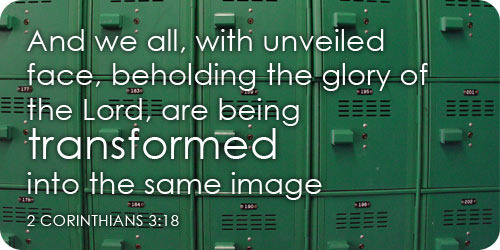 I think the answer to that would be the same thing that anyone can do to be more like Christ. Certainly they can meditate on His Word; 2 Corinthians 3 talks about being conformed to the image of Christ, and that comes through meditating on Him. Certainly you want to (and this is very important for high schoolers) choose the right friends. Some friends are going to lead you the wrong way. The book of Proverbs is really about that, and has example after example of getting in with the wrong crowd. (I share more in this article.)
I think the answer to that would be the same thing that anyone can do to be more like Christ. Certainly they can meditate on His Word; 2 Corinthians 3 talks about being conformed to the image of Christ, and that comes through meditating on Him. Certainly you want to (and this is very important for high schoolers) choose the right friends. Some friends are going to lead you the wrong way. The book of Proverbs is really about that, and has example after example of getting in with the wrong crowd. (I share more in this article.)
First Corinthians 15:33 says that bad company corrupts good morals. If you choose the wrong friends, you are going to become more like them. If you choose friends who love Christ, you’re going to grow in Christ.
Julia:
Yes. One of the things I thought of was how involved Jesus was in His community and in people’s lives. We need to really encourage high schoolers to be part of a church where they can both be receiving the Word of truth from someone they respect, but then also teaching it to those who are younger than they are.

Related Resources
Blog: God's Word as Our Primary Influence
Article: What advice would you give to young people related to their friendships?
Book: The Ishbane Conspiracy
Stock photo credit: tome213 via sc.hu
June 21, 2013
Introducing Eternity, My First Graphic Novel

I’m very excited about my first graphic novel, called Eternity, which is based on Christ’s story of the rich man and Lazarus found in Luke 16. If you’re not familiar with the term, a graphic novel is an extended comic book form (128 pages, over 600 panels of full-color art).The book has just been released and is now available from our ministry in print and as an ebook.
While it is fiction, I have labored to make the book Christ-centered, Bible-saturated and theologically sound. The liberties I took largely involved expanding a 13 verse parable of Jesus by interjecting additional characters and a larger storyline of the gospel of grace, drawn from the whole counsel of God.
In this video, I share more about the book:
One day two years ago I spent an hour in the huge graphic novel section of a Portland Barnes and Noble. I watched the young people come and read, sitting on the floor, captivated by the art, dialogue and narrative captions. As I watched them, God touched my heart and I prayed for them as they came and went.
I realized that very few if any of these young people ever attend church (hey, I live in Oregon), or would be open to reading the books I write, or 98% of other Christian books. I longed to reach into their world and introduce them to the true gospel of Jesus in a form they would actually read.
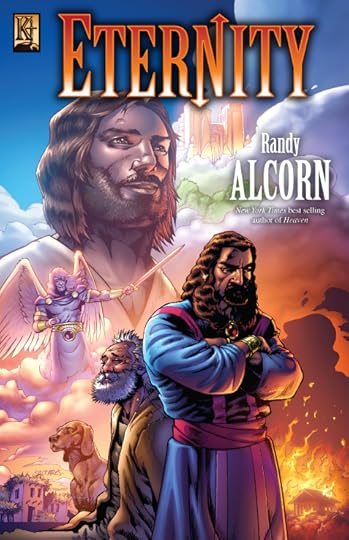 God laid it on my heart then and there to write a graphic novel that tells a story highlighting Christ’s person and redemptive work, a story full of grace and truth, one that speaks of the eternal destinations of Heaven and Hell. The graphics took two artists (who’ve worked with Marvel Comics) fifteen months to complete. I think they did an amazing job.
God laid it on my heart then and there to write a graphic novel that tells a story highlighting Christ’s person and redemptive work, a story full of grace and truth, one that speaks of the eternal destinations of Heaven and Hell. The graphics took two artists (who’ve worked with Marvel Comics) fifteen months to complete. I think they did an amazing job.
I was raised in an unbelieving home. I grew up reading comic books. I read them passionately and “graduated” to science fiction. Then, when I first heard the gospel as a teenager, I read every Christian book I could find, including the Bible. I came to faith in Christ through reading God’s Word, and my love for reading transferred over to Lewis, Tozer, Schaeffer, Packer, Spurgeon and countless others who I read voraciously.
Looking back, I’m grateful for the comics that developed my thirst for reading, because they were a “gateway” to reading Scripture and the great books of substance that have been a vital part of my life ever since. This much I know—had someone given me this graphic novel 45 years ago, when I was a young teen, I would have read it cover to cover, and would have heard the gospel for the first time in my life.
I'm convinced that through Eternity and its compelling art, God will not only allow me to reach a new audience, but also—and this is my prayer—to draw others who have read my books before into this new venue of graphic novels. If you like my other fiction, I think you’ll like this as much, maybe more. And for sure, you’ll know a young person to share it with! Terri Blackstock, New York Times Best-Selling Author of Intervention and Predator, wrote after reading the book, “This is the first graphic novel I've ever read, and I found myself captivated at the fabulous art and the depth of story. Suitable for children and adults alike, I think this is going to be a big hit!”
So if you feel, “I’m too old/studious/theological to read a big comic book,” I’d encourage you simply to read a few pages and SEE. If you give it a try, I think you may be surprised at how engaging a graphic novel with beautiful art and biblical themes can be. It may have more depth and substance and be more edifying than you imagine.
I’ll end with a note from author Max Lucado that contained these encouraging words: “Randy Alcorn’s graphic novel Eternity will touch hearts, grant hope and change lives. As a master storyteller, Randy takes us through the story of The Rich Man and Lazarus. I have read this biblical account many times, but I will never read it the same way again. Randy has brought it to life. I pray that God uses Randy’s work to bring an eternal perspective to every person who reads this work.”

Partner with EPM in Sharing the Book (Plus a Special Offer)
We want to encourage you to read Eternity yourself (if you've never read a graphic novel, we predict you'll like it!) and to catch the vision of how you can share it with others. Here's four ways you can partner with us in sharing the book:
1. A "Buy-two-get-one-free" special
Purchase three paperback Eternity books from www.epm.org/eternity (retail $16.99, EPM price $13.59 per book), and during checkout, use the discount code eternityblog to deduct the full price of one book. Offer ends July 31, 2013. Limit one free book per order.
2. Send us your stories
We'd love to hear your stories of how God has used the book to impact readers. Send them to us online.
3. Support our “Books for Prisoners” fund
Help us send the book to prisoners nationwide. Donate online at www.epm.org/donate (under "Special Funds" select "Books for Prisoners”).
4. Join our Facebook party on Thursday, July 25
When: Thursday, July 25 from 5:30 to 7 p.m. PT (8:30 to 10 p.m. ET)
Where: Randy's Facebook page (www.facebook.com/randyalcorn)
What: Join us on Randy’s Facebook page to celebrate Eternity, the graphic novel. Ask questions and interact with Randy, plus get a behind-the-scenes look at the creation of the novel and receive a special offer from EPM. Did we mention we’re giving away prizes to those who participate? You won’t want to miss it!
June 19, 2013
Appreciating the Protection of God’s Laws
In this video and the following transcript, I share some thoughts.
When it comes to God’s laws in Scripture, a lot of people wonder about legalism. How can you hold to the truth and still have a spirit of grace? How can you hold to truth and not be a law-keeping Pharisee?
 One of the things we have to remember is why God gave us His law in the first place. I’ve used the analogy in my book The Purity Principle about driving along a mountain pass when it’s dark and foggy, and your car runs off the road and you hit the guardrail. You slam on the breaks and get out of the car with a flashlight. What do you do? Do you look at the fender of your car and say, “Oh no. That rotten guardrail! Why did somebody put that guardrail there? Now I’ve got a dented fender!”?
One of the things we have to remember is why God gave us His law in the first place. I’ve used the analogy in my book The Purity Principle about driving along a mountain pass when it’s dark and foggy, and your car runs off the road and you hit the guardrail. You slam on the breaks and get out of the car with a flashlight. What do you do? Do you look at the fender of your car and say, “Oh no. That rotten guardrail! Why did somebody put that guardrail there? Now I’ve got a dented fender!”?
No, you thank God for that guardrail. It’s there for your benefit. That guardrail saved your life!
One of the things we have to remember is that God gives us His truth not just to impose His arbitrary standards on us. They are not arbitrary; they’re based on His character and given to us out of His love for us.
When we are living according to God’s truth, it is not so that we can say, “I’ve been obedient. Look at me, I’ve been a good boy or a good girl.” Yes, we can and should live to please God, but we can also honor the fact that He has given us His truths and commandments out of love for us.
I think we need to look at God’s truth and His requirements and commandments in a different way—not as heavy, burdensome things, but rather as things He created us to do to bring honor to Him. Ultimately they’re not only for His glory, they’re also for our good.

Related Resources
Blog: Are spiritual disciplines legalism?
Article: Protecting Purity in a Technological Corinth
Book: The Purity Principle
Road barrier photo credit: libyphoto via sxc.hu
June 17, 2013
Does being like Jesus mean not talking about Hell?
These days you’ll often hear people say something like, “Instead of condemning people and threatening them with Hell, we should be like Jesus and love them.”
In the following video and transcript, I share some thoughts.
When I was filming my video answer to this question, I had to smile. Now that’s not the sort of thing I suppose you should smile about, because it is an extremely serious subject. But I just kind of have to smile at how strange it is that people would make that statement. Here’s the reason: no one in the entire Bible says more about Hell and its horrors than Jesus Christ. So if we’re going to be like Jesus, it doesn’t mean we should not talk about Hell. If we’re going to be like Jesus, it means we should talk about Hell.
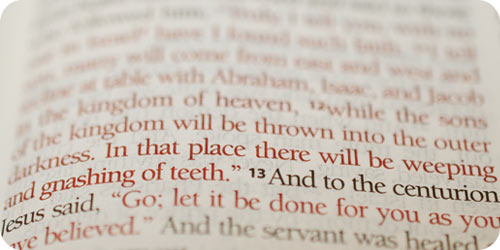 As far as threatening people with Hell, I’ve never threatened anyone with Hell. The very fact that I recognize that Jesus said there is a Hell and that it’s a terrible place, is simply acknowledging “I believe what Jesus said.”
As far as threatening people with Hell, I’ve never threatened anyone with Hell. The very fact that I recognize that Jesus said there is a Hell and that it’s a terrible place, is simply acknowledging “I believe what Jesus said.”
I don’t have the power to send someone to Hell, nor did I think up the idea of it. It’s there in the Bible. God talks about it as a place of eternal punishment for evildoers, for those who have not experienced the redemptive work of Christ in their lives.
I don’t think I’m supposed to be God’s spokesperson in the sense of giving Him a facelift or airbrushing Him and making Him look kinder and getting Him off the hook. He’s the one who says there is a Hell. Jesus says there’s a Hell. And, by the way, He went to the cross to deliver you and me from it!

Related Resources
Blog: Albert Mohler on the Air Conditioning of Hell
Video: What is the purpose of Hell?
Book: If God Is Good
June 14, 2013
A Sea Turtle Video

I love sea turtles. Some of my greatest memories are hanging out with turtles while snorkeling or diving. Here’s an entertaining 44-second video of a turtle with an apparent taste for the camera. Love these wonderful creatures God makes, and can’t wait for the world where “The wolf will live with the lamb, the leopard will lie down with the goat, the calf and the lion and the yearling together; and a little child will lead them” (Isaiah 11:6).

Related Resources
Blog: God's Artistry in Giant Sea Turtles
Resource: How can you say there will be oceans on the New Earth when Rev. 21:1 says something different?
Book: The Promise of Heaven
June 12, 2013
The Problem with Christoplatonism

In the following video and transcript, I share some thoughts:
Christoplatonism—there’s a word that you don’t hear every day. It’s actually a word that I made up (probably the only word I’ve ever made up!) and used in my comprehensive Heaven book to speak of the Christianized philosophy of Plato.
There is the secular philosophy of Plato that the material world is bad—it’s evil—and only the invisible, spiritual world is good. But then there were Christian church fathers who took up the ideas of Platonism and tried to read them into the Bible. They made the Bible appear to be condemning the physical material world. This is a real trick because you can’t really do that authentically with Scripture. God looked at the world that He had made after the sixth day of Creation, and “behold, it was very good.” He approved of His whole creation. All of it—the food that we eat, the plants, the water, the animals, marital sex—is good and made by God for good purposes.
Then sin came into the world. It’s not that sin made these things bad; it’s that we fell as human beings and started to misuse and idolize some of these things. The teaching of Scripture is not that we’ll be delivered from a material world and material bodies, but that ultimately we will live as resurrected beings in a resurrected universe for all eternity. We’ll enjoy the goodness of God in the material realm, just as we do in the spiritual realm. In fact, those two realms will be brought together forever in the eternal incarnate Christ, on the New Earth. He will be in human form forever, reigning on the throne of the New Jerusalem with Him as King of Kings and us as kings (with a lower case “k”), reigning under Him. So in God’s renewed, resurrected, redeemed creation, we will worship Him forever.

Related Resources
Blog: The Spiritual Body: A Real Body
Video: Heaven and Christoplatonism
Book: Heaven
Wheat field image credit: zomb_kille via sxc.hu
June 10, 2013
Spend Your Day with Eternity in Mind
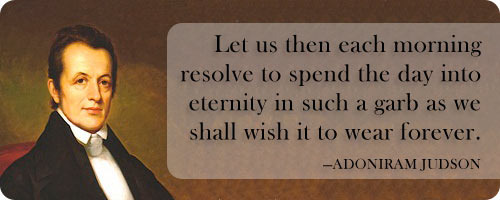
Missionary Adoniram Judson said this (read these words carefully):
A life once spent is irrevocable. It will remain to be contemplated for eternity. The same may be said of each day. When it is once past, it is gone forever. All the marks which we put upon it, will exhibit forever. Each day will not only be a witness of our conduct, but will affect our everlasting destiny. How shall we then wish to see each day marked with usefulness? It is too late to mend the days that are past. The future is in our power. Let us then each morning resolve to spend the day into eternity in such a garb as we shall wish it to wear forever. And at night, let us reflect that one more day is irrevocably gone indelibly marked.
In the video and following transcript, I share some thoughts on this quote:
Judson is saying that everything we do each day can make a difference for eternity. It really does matter how we live. Missionary C. T. Studd said, “Only one life will soon be past. Only what’s done for Christ will last.” John Wesley said, “I judge all things by the price they shall gain in eternity.”
God tells us that whatever we do, whether we eat or drink or whatever we do, do it to His glory (1 Corinthians 10:31). This includes the “mundane” things of life, like driving somewhere and picking up kids in the carpool and mowing the lawn. It’s not just evangelistic crusades, your Bible study group and going to church that matter (though those things are certainly important). This is each and every thing you do, and the work that you do. Do it all to God’s glory.
Every day matters. Every hour matters. So spend it with eternity in mind.

Related Resources
Blog: Francis Chan on Aging Biblically—a Message for All Ages
Resource: Ann Hasseltine Judson: America’s First Female Foreign Missionary
DVD Set: Eternity 101
June 7, 2013
The Fine Art of Selection

Life consists largely of selection—choosing one alternative over another. Those things we choose are our priorities.
Deciding “I’ll read the Bible and pray when I can find the time” is like saying “I’ll give to God’s work when I can find the money.” There are an infinite number of things on which both time and money can be spent. Without a careful plan and self-discipline, expenditures always rise to meet income. Living beyond your means of time—trying to spend time that you don’t have—is courting disaster.
Time in God’s Word doesn’t just happen. You must make it happen. “Do not conform any longer to the pattern of this world, but be transformed by the renewing of your mind” (Romans 12:2). How do you renew your mind? I like to start my days listening to Scripture audio, which I play on my smartphone or iPod. If you can’t seem to carve out time to sit down, you can listen as you fix breakfast, pack lunch, load the dishwater, clean the fridge, you name it. When you’re doing something mindless, fill your mind with Scripture. And you can listen to good novels and nonfiction too! (There are websites and smartphone apps with hundreds of free audiobooks.)
The hardest lesson we learned in our first twenty years of marriage was this: life is full of good, worthwhile, and meaningful programs, activities, organizations, causes, and ministry opportunities—the vast majority of which we cannot and should not be involved with!
It is not sufficient that something be good or important. It must be the best and most important for me, and God must show me that. Why? For the same reason that if I have a hundred dollars to spend on groceries this month, I should buy meat and milk and fruit and vegetables, not donuts and chips. Most good things I will never be able to do. If I try, I’ll burn out and end up dropping out of half of them and doing the rest poorly.
We sometimes mistake Christian busyness for true spirituality, failing to realize that over-commitment is no more honoring to God than under-commitment. In our relentless pursuit of spiritual success, we drag ourselves through a dizzy, busy, barren life. Our unspoken motto seems to be “Weariness is next to godliness.”
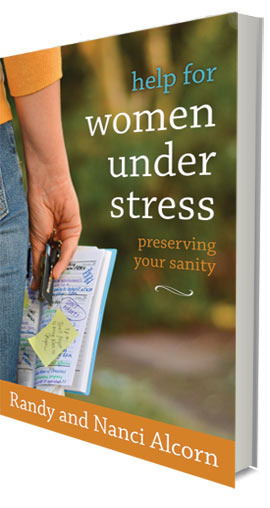 In the next two months you may be asked to host a luncheon, collect for the American Cancer Society, teach a class, lead a discussion group, work in the church nursery, be a room mother, run a booth at the carnival, serve punch at a wedding, coach soccer, be a teacher’s aide, cook for the high school group camp-out, and go on the women’s retreat. Very likely it is God’s will for you to do a few of these good things. But all of them or even most of them? No way.
In the next two months you may be asked to host a luncheon, collect for the American Cancer Society, teach a class, lead a discussion group, work in the church nursery, be a room mother, run a booth at the carnival, serve punch at a wedding, coach soccer, be a teacher’s aide, cook for the high school group camp-out, and go on the women’s retreat. Very likely it is God’s will for you to do a few of these good things. But all of them or even most of them? No way.
Consider making it a policy never to say “yes” to anything until you’ve thought and prayed about it for one week. Even if someone needs an answer today, tell them you’ll call them back no sooner than a few hours. Don’t impulsively say “Yes” or you will feel—and be—out of control. Of course, there’s also the woman or man who says “No” to everything and needs to learn to say “Yes.” Be sure you say “Yes” enough to get your exercise, and “no” enough to get your rest. Steward your life so that when it’s something you sense God’s prompting to do, you will have said no often enough to give you room to say yes to those relatively few things God wants you to do.

Excerpted from Randy and Nanci Alcorn's book Help for Women Under Stress .
Related Resources
Blog: How do I stay motivated in my relationship with Jesus Christ?
Resource: What is your Bible study method?
Painting photo credit: arbara_v via. sxc.hu
June 5, 2013
Taking Stock of Your Time
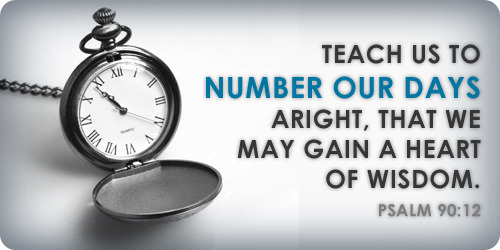
“Dost thou love life? Then do not squander time, for that is the stuff which life is made of.”
Over three thousand years before Benjamin Franklin said those words, Moses said these:
Teach us to number our days aright,
That we may gain a heart of wisdom. (Psalm 90:12)
The New Testament speaks the same message: “Redeem the time,” or “Make the most of every opportunity” (Colossians 4:5b).
Time management is life management. But we don’t need to save time in order to fill it up with more responsibilities. Rather, we need to manage our lives better so we may take more time to enjoy the Lord, our families, our church, our neighbors, and all the important people and opportunities of life that too often get buried beneath our busyness.
Nanci and I sit down periodically to take stock of what we are doing with our lives. We have sometimes discovered that our real priorities—demonstrated by how we spent our time—haven’t reflected our ideal priorities, how we believe we should best spend our time.
We suggest you try this kind of evaluation yourself by making a list of all your daily and weekly activities. Here is a list (in no particular order) of some things to include. Feel free to add others:
time in Word/prayer
volunteer work
children/grandchildren
eating
shopping
getting dressed
exercise
driving
phone calls
checking email
church
parents/in-laws
school/study
daily routine
doing makeup
relaxation
watching TV
hobbies
sleep/naps
spouse
friends
yard/garden
bathing
job/career
church work
reading
social networking
For a week or two, keep track of how much time you spend on each of these, and write down the total. Once you’ve determined how you spend your time, decide how you want to spend your time. Techniques to save time are ultimately useless until you’ve decided what you want to do with the time you’ve saved. Time that is saved but uncommitted disappears.
If you’ve determined how much time you spend on the above and other things, go back and put the letter “M” for “more” next to the things you want or need to do more, the letter “L” for less” by those you want or need to do less. Cross out the things you can afford not to do, and add things you presently aren’t doing but want to do.
Note that since you are presently using all the time you have, in order to add anything, something must go. If you add a scrapbooking class on Tuesday nights, the time must come from laundry, family, exercise, devotions, sleeping, television, phone calls or somewhere else. Remember, time is like money—spend it on one thing and you can’t spend it on another. So get the best value for your time. Spend it wisely—but don’t overspend. Redeem the time, for God’s glory and the good of yourself and others.

Related Resources
Blog: Stewarding Your Time
Resource: Can't You See That I'm Busy?
Book: Help for Women Under Stress
Pocket watch photo credit: fwdthought via sxc.hu







